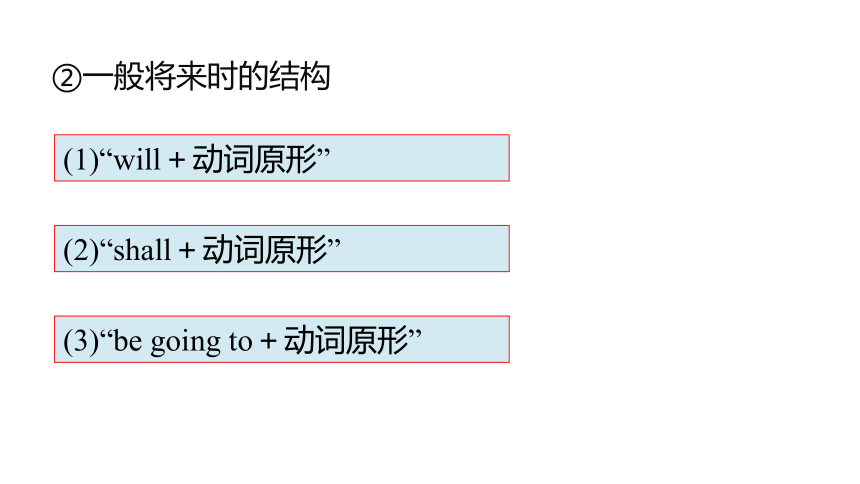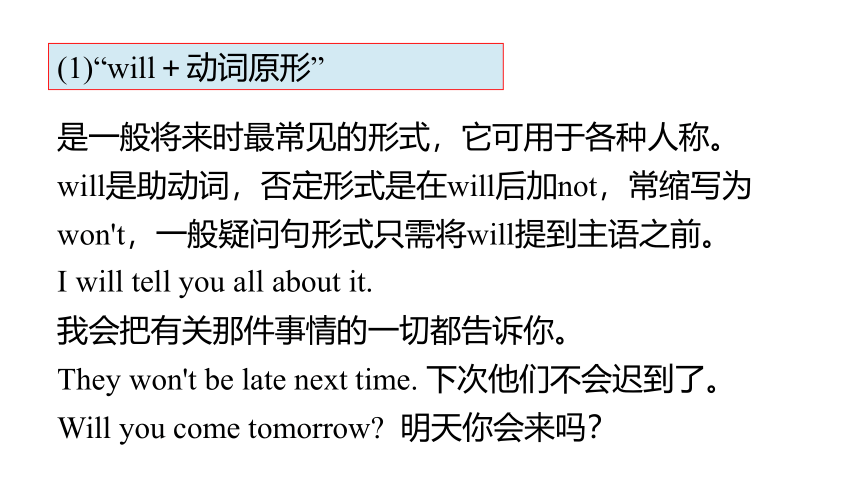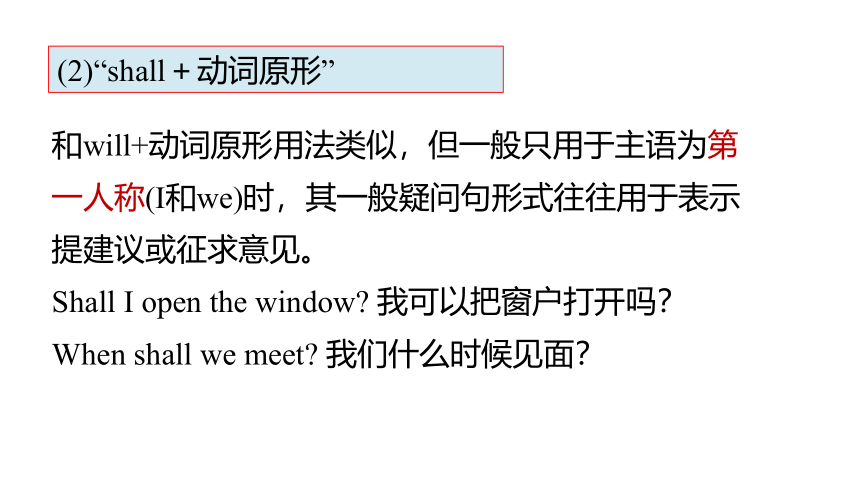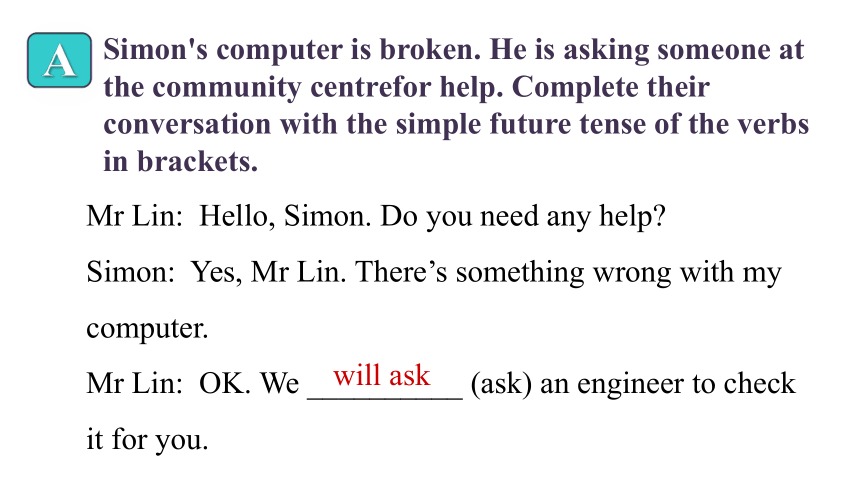2021-2022学年牛津译林版英语七年级下册Unit2 Neighbours Grammar课件(共17张PPT)
文档属性
| 名称 | 2021-2022学年牛津译林版英语七年级下册Unit2 Neighbours Grammar课件(共17张PPT) |  | |
| 格式 | zip | ||
| 文件大小 | 227.9KB | ||
| 资源类型 | 教案 | ||
| 版本资源 | 牛津译林版 | ||
| 科目 | 英语 | ||
| 更新时间 | 2022-02-17 11:55:56 | ||
图片预览







文档简介
(共17张PPT)
Unit 2 Neighbours
Grammar
课程导入
Lily’s bicycle is broken.
Mr Green’s computer doesn’t work well.
Little Tom has problems with his homework.
Mrs Chen is very old and gets sick these days.
Someone is going to help her to fix it.
The computer engineer is going to check his computer.
Some college students will help him.
Some volunteers will visit her and do some shopping for her.
Things that will happen
Problems
Help
Simple future tense
语法聚焦
一般将来时
① 什么是一般将来时?
一般将来时表示将来某个时间要发生的动作或存在的状态,也表示将来经常或反复发生的动作,常与tomorrow, next month, in a week, this afternoon, tonight, soon, how soon, in the future等时间状语连用。
(1)“will+动词原形”
(2)“shall+动词原形”
(3)“be going to+动词原形”
②一般将来时的结构
是一般将来时最常见的形式,它可用于各种人称。will是助动词,否定形式是在will后加not,常缩写为won't,一般疑问句形式只需将will提到主语之前。
I will tell you all about it.
我会把有关那件事情的一切都告诉你。
They won't be late next time. 下次他们不会迟到了。
Will you come tomorrow 明天你会来吗?
(1)“will+动词原形”
和will+动词原形用法类似,但一般只用于主语为第一人称(I和we)时,其一般疑问句形式往往用于表示提建议或征求意见。
Shall I open the window 我可以把窗户打开吗?
When shall we meet 我们什么时候见面?
(2)“shall+动词原形”
8
A
Simon's computer is broken. He is asking someone at the community centrefor plete their conversation with the simple future tense of the verbs in brackets.
Mr Lin: Hello, Simon. Do you need any help
Simon: Yes, Mr Lin. There’s something wrong with my computer.
Mr Lin: OK. We __________ (ask) an engineer to check it for you.
will ask
8
Simon: When _____ the engineer _____ (be) free
Mr Lin: Well, we _________ (call) him first. ______ you ________ (wait) for us to call back
Simon: All right. I ___________ (wait) for your call. Thanks.
Mr Lin: You’re welcome.
will call
will
be
Will
wait
will wait
“be going to+动词原形”主要强调打算、准备或即将要发生的动作,be动词要随主语人称和数的变化而变化,否定句在be动词后加not,一般疑问句需将be动词提到主语之前。另外,在这一结构中,如果谓语动词是表示“来”或“往”的动词,如leave, go, come, return, fly等,则习惯用它们的进行时表示将来。
(3)“be going to+动词原形”
It isn't going to rain this afternoon.
今天下午不会下雨。
What are you going to have for supper today
今天晚饭你们打算吃什么?
They are flying to Shanghai.
他们打算乘飞机去上海。
③“will/shall+动词原形”与“be going to+动词原形”的用法比较
(1)表示计划、打算做某事或根据目前情况推测某事可能发生时,“be going to+动词原形”比“will+动词原形”更常用。
We're going to hold a sports meeting next week.
下周我们打算举行一场运动会。
What are you going to do when you grow up
你长大后打算做什么?
(2)表示客观上将要发生、与主观愿望和判断无关或表示带有意愿色彩的将来的情况下,一般不用“be going to+动词原形”,而用“will+动词原形”。
The sun will rise at 6 tomorrow morning.
明天早晨6点钟太阳将会升起。
I will help you if you need.
如果你需要,我会帮你的。
B
Simon is telling Amy about his plan for a day out with his uncle's family.Help him use the correct forms of be going to to talk about his plan.
8
Simon: Hi, Amy. My parents and I are planning a day out with my uncle’s family the day after tomorrow.
Amy: Great! What _____ you ___________(do)
Simon: I ______________(buy) some food, and my cousin Annie _____________ buy some plates and forks.
Amy: What _____ your parents ___________(do)
are
going to do
am going to buy
is going to buy
are
going to do
8
Simon: They _______________ bring some water.
Amy: How about your uncle
Simon: He ______________ (make) a fire.
Amy: And your aunt What ____ she __________ (do)
Simon: She _______________ (cook) some food.
are going to bring
is going to make
is
going to do
is going to cook
课堂练习
(1)I want to know when he ___________ (leave) for New York tomorrow.
(2)It is very cold these days. It ______________ (snow) soon.
(3)I'm afraid there ________(be) a meeting this afternoon.
I can't go shopping with you.
用括号内所给单词的适当形式填空
is leaving
is going to snow
will be
(4) —_______ you _____________ (get) up early tomorrow morning
—Yes, I am.
(5)—When ________ we ________ (meet)
—At 8:00 tomorrow morning.
Are going to get
shall meet
Unit 2 Neighbours
Grammar
课程导入
Lily’s bicycle is broken.
Mr Green’s computer doesn’t work well.
Little Tom has problems with his homework.
Mrs Chen is very old and gets sick these days.
Someone is going to help her to fix it.
The computer engineer is going to check his computer.
Some college students will help him.
Some volunteers will visit her and do some shopping for her.
Things that will happen
Problems
Help
Simple future tense
语法聚焦
一般将来时
① 什么是一般将来时?
一般将来时表示将来某个时间要发生的动作或存在的状态,也表示将来经常或反复发生的动作,常与tomorrow, next month, in a week, this afternoon, tonight, soon, how soon, in the future等时间状语连用。
(1)“will+动词原形”
(2)“shall+动词原形”
(3)“be going to+动词原形”
②一般将来时的结构
是一般将来时最常见的形式,它可用于各种人称。will是助动词,否定形式是在will后加not,常缩写为won't,一般疑问句形式只需将will提到主语之前。
I will tell you all about it.
我会把有关那件事情的一切都告诉你。
They won't be late next time. 下次他们不会迟到了。
Will you come tomorrow 明天你会来吗?
(1)“will+动词原形”
和will+动词原形用法类似,但一般只用于主语为第一人称(I和we)时,其一般疑问句形式往往用于表示提建议或征求意见。
Shall I open the window 我可以把窗户打开吗?
When shall we meet 我们什么时候见面?
(2)“shall+动词原形”
8
A
Simon's computer is broken. He is asking someone at the community centrefor plete their conversation with the simple future tense of the verbs in brackets.
Mr Lin: Hello, Simon. Do you need any help
Simon: Yes, Mr Lin. There’s something wrong with my computer.
Mr Lin: OK. We __________ (ask) an engineer to check it for you.
will ask
8
Simon: When _____ the engineer _____ (be) free
Mr Lin: Well, we _________ (call) him first. ______ you ________ (wait) for us to call back
Simon: All right. I ___________ (wait) for your call. Thanks.
Mr Lin: You’re welcome.
will call
will
be
Will
wait
will wait
“be going to+动词原形”主要强调打算、准备或即将要发生的动作,be动词要随主语人称和数的变化而变化,否定句在be动词后加not,一般疑问句需将be动词提到主语之前。另外,在这一结构中,如果谓语动词是表示“来”或“往”的动词,如leave, go, come, return, fly等,则习惯用它们的进行时表示将来。
(3)“be going to+动词原形”
It isn't going to rain this afternoon.
今天下午不会下雨。
What are you going to have for supper today
今天晚饭你们打算吃什么?
They are flying to Shanghai.
他们打算乘飞机去上海。
③“will/shall+动词原形”与“be going to+动词原形”的用法比较
(1)表示计划、打算做某事或根据目前情况推测某事可能发生时,“be going to+动词原形”比“will+动词原形”更常用。
We're going to hold a sports meeting next week.
下周我们打算举行一场运动会。
What are you going to do when you grow up
你长大后打算做什么?
(2)表示客观上将要发生、与主观愿望和判断无关或表示带有意愿色彩的将来的情况下,一般不用“be going to+动词原形”,而用“will+动词原形”。
The sun will rise at 6 tomorrow morning.
明天早晨6点钟太阳将会升起。
I will help you if you need.
如果你需要,我会帮你的。
B
Simon is telling Amy about his plan for a day out with his uncle's family.Help him use the correct forms of be going to to talk about his plan.
8
Simon: Hi, Amy. My parents and I are planning a day out with my uncle’s family the day after tomorrow.
Amy: Great! What _____ you ___________(do)
Simon: I ______________(buy) some food, and my cousin Annie _____________ buy some plates and forks.
Amy: What _____ your parents ___________(do)
are
going to do
am going to buy
is going to buy
are
going to do
8
Simon: They _______________ bring some water.
Amy: How about your uncle
Simon: He ______________ (make) a fire.
Amy: And your aunt What ____ she __________ (do)
Simon: She _______________ (cook) some food.
are going to bring
is going to make
is
going to do
is going to cook
课堂练习
(1)I want to know when he ___________ (leave) for New York tomorrow.
(2)It is very cold these days. It ______________ (snow) soon.
(3)I'm afraid there ________(be) a meeting this afternoon.
I can't go shopping with you.
用括号内所给单词的适当形式填空
is leaving
is going to snow
will be
(4) —_______ you _____________ (get) up early tomorrow morning
—Yes, I am.
(5)—When ________ we ________ (meet)
—At 8:00 tomorrow morning.
Are going to get
shall meet
